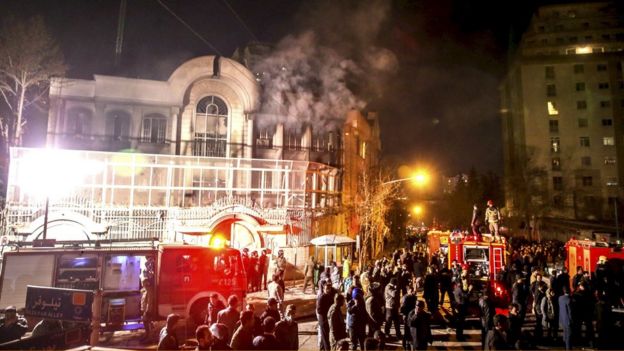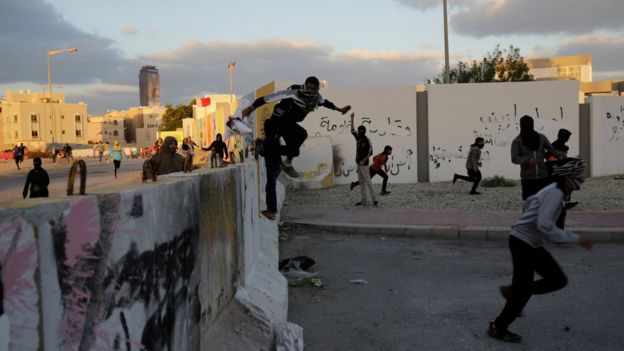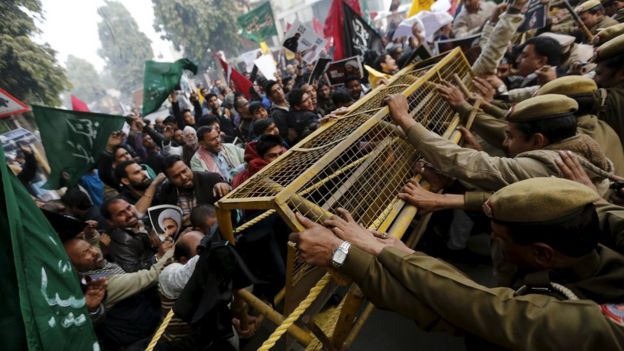Kuwait has announced it is recalling its ambassador to Iran as a regional row over the execution of a Shia cleric in Saudi Arabia deepens.
Saudi Arabia's embassy in Tehran was ransacked and set alight on Saturday, after it executed Shia Muslim cleric Sheikh Nimr al-Nimr and 46 others.
Saudi Arabia broke off diplomatic ties with Iran in response, followed on Monday by its allies Bahrain and Sudan.
The US, UN and Turkey are among those calling for calm in the region.
Sunni Muslim Saudi Arabia and Shia Iran are major rivals for power in the Middle East and back opposing sides in the conflicts in Syria and Yemen.
Saudi insists peace efforts in those countries should not be affected by the spat but criticised Iran's contribution to the process.
The Kuwaiti government said it was recalling its ambassador from the Iranian capital, describing the attacks as a flagrant breach of international norms.
It did not expel Tehran's ambassador or downgrade diplomatic ties.
Saudi Arabia's unexpected decision to carry out the executions - following convictions over terrorism-related offences - prompted an expression of "deep dismay" from the UN secretary general, while the US accused Saudi of exacerbating tensions "at a time when they urgently need to be reduced".
But analysts say that since then, Saudi Arabia has played a skilful hand in responding to the attacks on its missions in Tehran and the Iranian city of Mashhad.
 Reuters
Reuters AP
AP Reuters
Reuters
Saudi authorities announced late on Sunday that they were severing diplomatic relations with Iran. They said that all commercial and air traffic links were being cut and that Saudi citizens were banned from travelling to Iran.
As well as the moves by Bahrain, Sudan and Kuwait, the United Arab Emirates (UAE) has downgraded its diplomatic team in Iran.
And on Monday, the UN Security Council issued a strongly worded statement condemning the attack on the Saudi embassy - making no mention of the execution of the cleric.
Sunni-Shia divide
- The split arises from a dispute soon after the death of the Prophet Muhammad in 632 over who should lead the Muslim community
- Sunnis are estimated to make up between 85% and 90% of Muslims
- Although the two branches have co-existed for centuries and share many fundamental beliefs and practices, differences lie in the fields of doctrine, ritual, law, theology and religious organisation
Protests against Saudi Arabia have erupted outside Iran, including in Shia-majority Bahrain, where nonetheless Sunni authorities moved to express solidarity with Saudi, clamping down on demonstrations.
Iran reacted angrily to diplomatic moves on Tuesday.
Storming 'suspicious'
Saudi Arabia cannot "cover up for the crime of executing cleric al-Nimr by severing ties with Iran", President Hassan Rouhani was quoted as saying on state media.
Iran's justice minister was earlier quoted as criticising the storming of the Saudi embassy and suggesting that it may have been "orchestrated and supported by infiltrators". A government spokesman has called the storming "suspicious".
Earlier, in New York, Saudi UN ambassador Abdallah al-Mouallimi accused Iran of "interfering in the affairs of other countries, including our own".
He said the Iranians had been "taking provocative and negative positions... and I don't think the break in relations is going to dissuade them from such behaviour".
Painstaking efforts have been made to get the two sides to join peace talks later this month aimed at resolving the Syrian conflict, but observers say that with Saudi-Iranian diplomatic ties severed, chances of success look ever more distant.



No comments:
Post a Comment